Key takeaways:
- Transparency in fashion is vital for building consumer trust and advocating for ethical practices in the supply chain.
- Understanding the production process of jeans, from raw materials to finishing touches, enhances consumer appreciation and ethical decision-making.
- Brands like Everlane and Reformation demonstrate the importance of transparency and accountability, positively influencing consumer choices.
- When buying ethical jeans, prioritize brands that disclose material sources, labor practices, and certifications to foster a sustainable and responsible wardrobe.
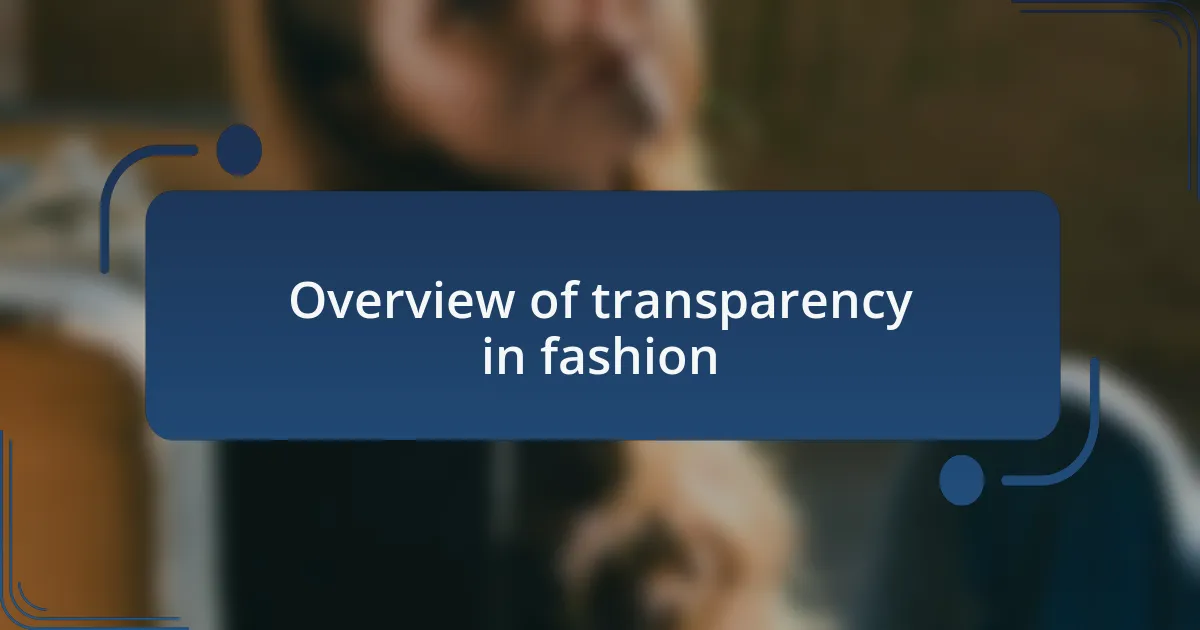
Overview of transparency in fashion
Transparency in fashion has emerged as a crucial element in how consumers perceive brands. I remember the first time I learned about the supply chain of my favorite brands; it was eye-opening to discover the vast complexities hidden behind the jeans I wore. How can we expect brands to gain our trust if they are not open about where and how their products are made?
As I continue to explore this topic, I find myself reflecting on why transparency matters so much to me. Knowing that a brand prioritizes ethical practices reassures me that my choices contribute positively to the world. Isn’t it comforting to think that every pair of jeans we buy can support fair labor conditions and sustainable practices?
Yet, while many brands claim to embrace transparency, not all follow through genuinely. I often wondered if vague sustainability claims are merely marketing strategies. The real challenge lies in holding these brands accountable, making it essential for consumers to dig deeper and demand clarity in every thread of our clothing.
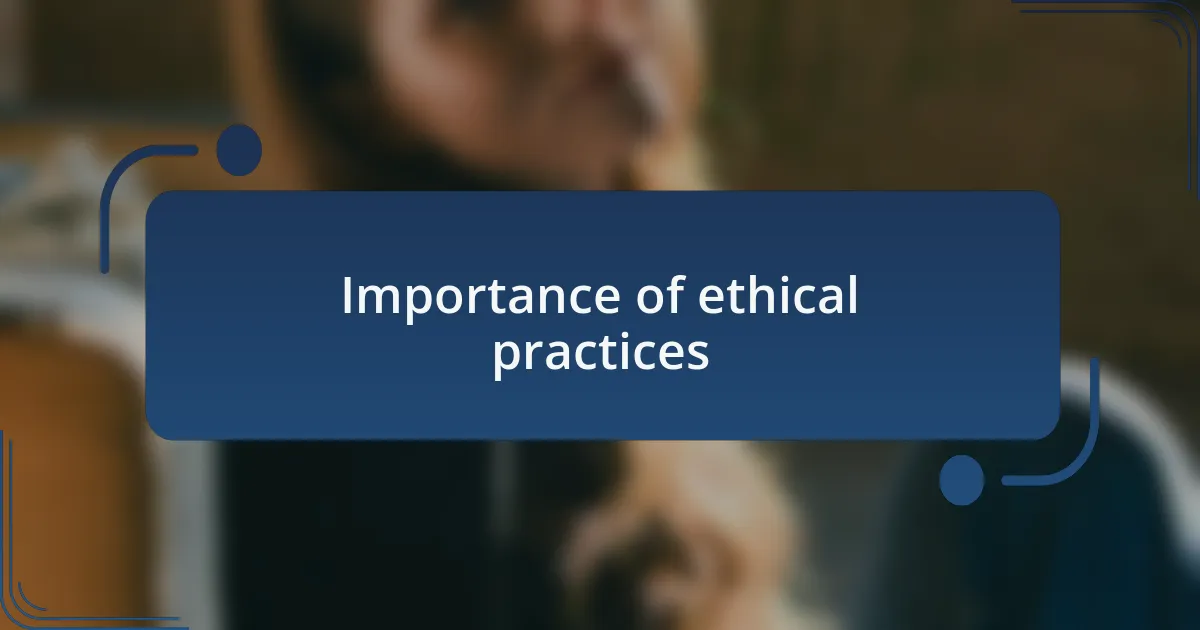
Importance of ethical practices
Ethical practices in fashion are vital not just for the planet, but for the people behind the products. I recall a time when I purchased jeans without thinking twice about their origin, only to later learn that workers in some factories endure poor conditions and low wages. This realization hit home—how could I support a brand that doesn’t prioritize the well-being of its workers?
It’s heartbreaking to consider the sacrifices some laborers make while we enjoy our fashion choices. Every time I slip into a pair of ethically-produced jeans, I feel a sense of pride knowing I’m part of a movement toward positive change. Don’t you think we owe it to everyone involved in the fashion supply chain to make choices that reflect our values?
Moreover, the importance of ethical practices goes beyond mere consumer guilt; it creates a ripple effect that can transform the industry. I often ponder how our collective choices can pressure brands into adopting better practices. If we demand transparency, we empower ourselves to be advocates for fairness in fashion—a cause that not only benefits those who produce our clothes but also enriches our own lives in the process.
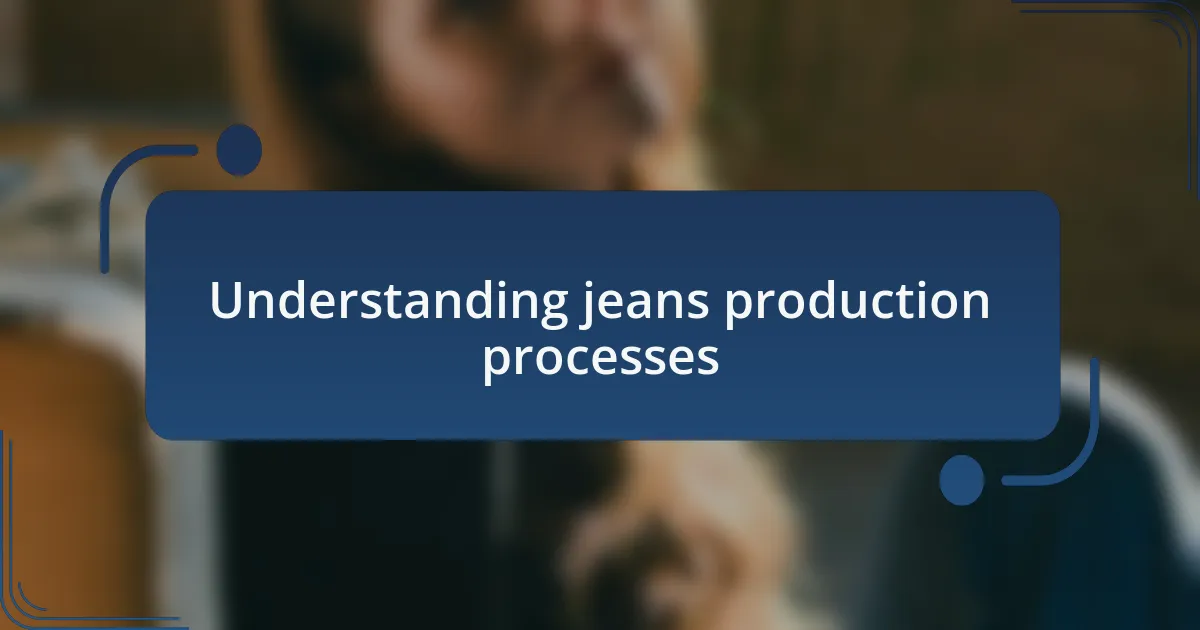
Understanding jeans production processes
Understanding the jeans production process begins with the raw materials. When I first learned about the cotton industry, I was shocked to discover the amount of water and pesticides used. It made me rethink my jeans shopping habits—how sustainable is the cotton used, and what impact does that have on communities and ecosystems?
Once the cotton is harvested, it undergoes a series of steps, including spinning, dyeing, and weaving. I remember visiting a factory where jeans were made, and seeing the intricate machinery in action brought the production process to life. It was eye-opening to see how much skill and effort goes into creating just one pair, making me appreciate my jeans on a whole new level.
Finally, the finishing touches, like distressing and washing, play a huge role in the jeans you ultimately wear. Have you ever paused to consider that those perfect fades and rips weren’t just naturally occurring? It’s a careful art, often involving chemicals that can be harmful. Understanding these processes not only informs our buying decisions but allows us to connect with the stories behind our clothes, making our choices feel even more meaningful.
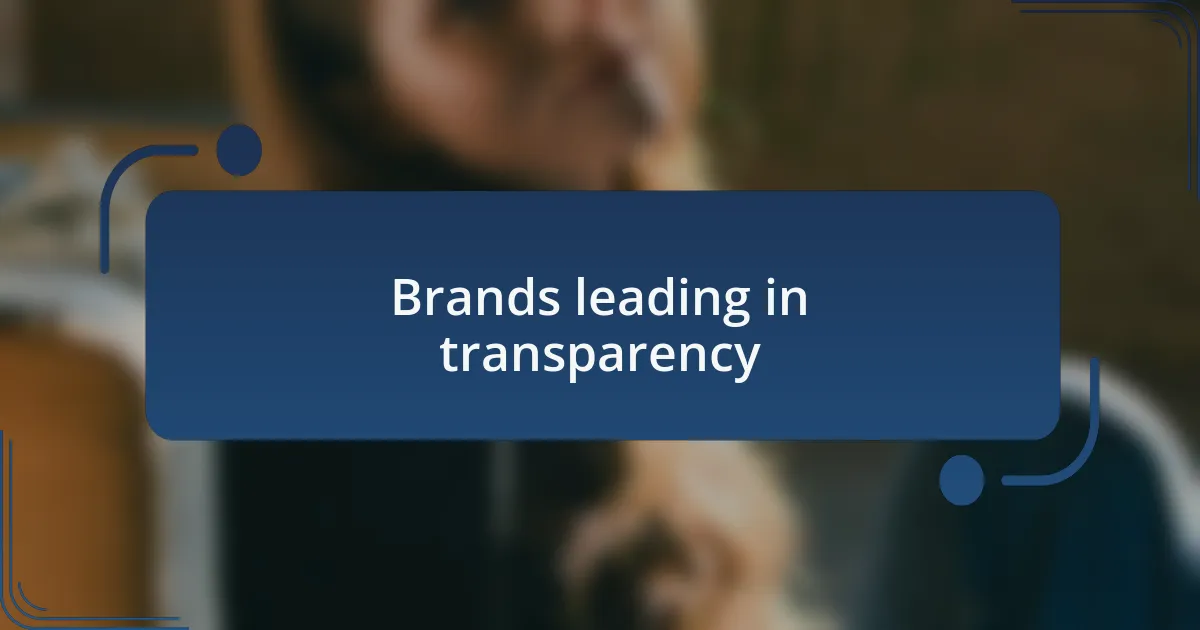
Brands leading in transparency
Brands that lead in transparency resonate with a growing number of consumers who want to know the origins of their clothing. I recall a conversation I had with a friend who swore by a particular denim brand known for its ethical practices. When she explained how the brand sources its materials and collaborates with fair-trade factories, I started to perceive my own shopping tendencies differently.
Take Everlane, for instance. Their commitment to “Radical Transparency” has made a significant impact on the industry. I remember checking their website and feeling reassured knowing exactly where and how my jeans were made, down to the cost breakdown. It was empowering to see a brand openly share the realities of production and pricing—something I’ve always believed should be a standard practice.
Another standout is Reformation, which has not only highlighted its sustainability efforts but also provided a clear environmental impact score for each product. I once purchased a pair of their jeans, and as I read the score, I realized that my clothing choices could reflect my values. Isn’t it refreshing to have options that prioritize both style and sustainability? It reminds us that fashion can be beautiful and responsible at the same time.

Personal experiences with transparent brands
When I stumbled upon a local brand that champions transparency, it felt like a breath of fresh air. I vividly recall the moment I first tried on their jeans and felt the soft fabric against my skin, knowing it was made from organic cotton and dyed with environmentally friendly materials. Isn’t it incredible how knowing the story behind a product can enhance our connection to it?
I once had the opportunity to attend an event hosted by a transparent fashion brand, where they showcased their entire supply chain. Listening to the company’s founders share their struggles and successes in achieving ethical practices was eye-opening. I couldn’t help but think: how many brands would be willing to bare their challenges as openly? That authenticity left a lasting impression, making me eager to support their journey.
Another experience stands out from my search for ethical denim. I tried on a pair from a brand that not only provided details about their sourcing but also offered insights into the artisans who crafted each piece. As I wore those jeans, I felt connected to the people behind them in a way I hadn’t experienced before. It’s fascinating how transparency can transform a simple purchase into a meaningful story.
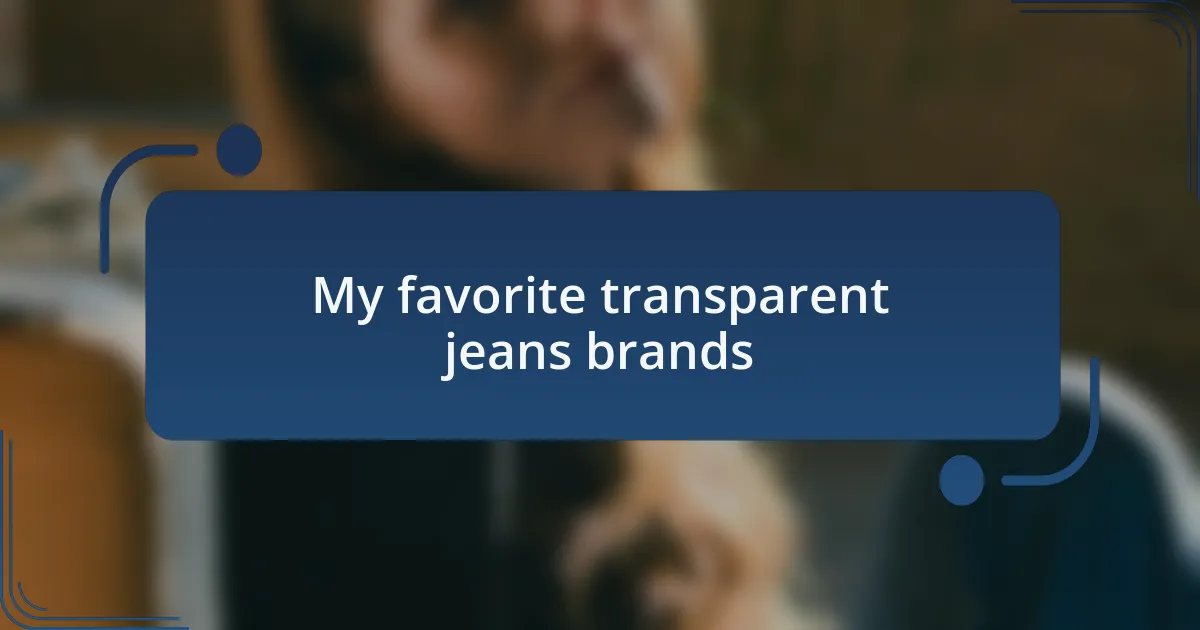
My favorite transparent jeans brands
One brand that has truly captured my heart is Reformation. When I first slipped into their jeans, not only did they fit like a dream, but I also learned that each pair is made from sustainable materials, and the brand is upfront about its water usage. It’s incredible to think that with every wear, I’m supporting a company that cares about the environment as much as I do. Have you ever thought about how much impact your wardrobe choices really have?
Another standout for me is Eileen Fisher. I appreciate their commitment to both craftsmanship and ethical practices. I remember visiting their store and being impressed by their transparency wall, which detailed the story behind each garment. It made me feel like I was part of a larger community, contributing to something good. Can clothing really foster such connections? It seems so!
Lastly, I can’t overlook ABLE, which not only produces high-quality denim but also empowers women through fair wages and job opportunities. Trying on a pair of their jeans, I felt a sense of pride knowing that I was supporting a brand dedicated to social impact. It’s a powerful reminder that fashion can do more than just look good—it can also make a difference in people’s lives. How often do we find ourselves in a position where our fashion choices are tied to a greater purpose?
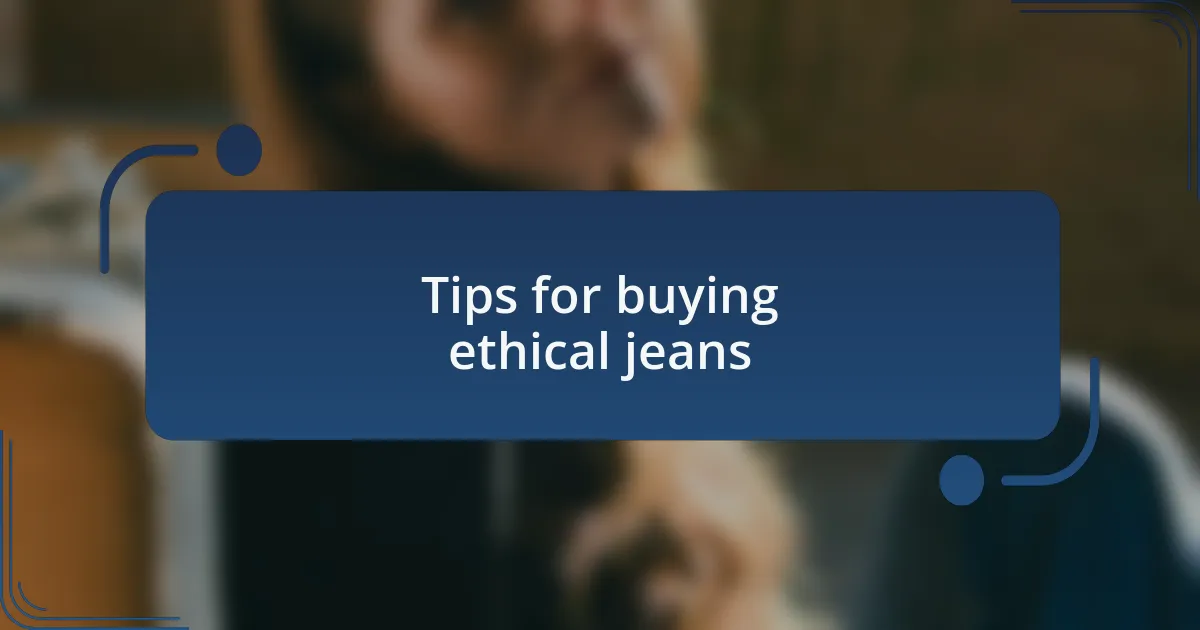
Tips for buying ethical jeans
When shopping for ethical jeans, I always start by checking the brand’s transparency. I look for details on their website about materials used and labor practices. It’s fascinating to discover how many brands now share their production processes; it feels like unearthing a valuable treasure in the pile of fast fashion.
Another tip is to pay attention to certifications. It’s reassuring to find jeans that carry labels like GOTS (Global Organic Textile Standard) or Fair Trade. I once purchased a pair certified by Fair Trade, and wearing them made me feel a deeper connection to the artisans behind them. Have you ever thought about the hands that crafted your clothes? It really adds a personal touch to your wardrobe.
Lastly, consider the longevity of the jeans. I prefer investing in a quality pair that will stand the test of time rather than cheap, trendy options. I remember a pair of jeans that I bought years ago; they’ve aged beautifully, and knowing they’re still around feels like a small victory. Isn’t it rewarding to have pieces in your closet that not only look good but are made responsibly?